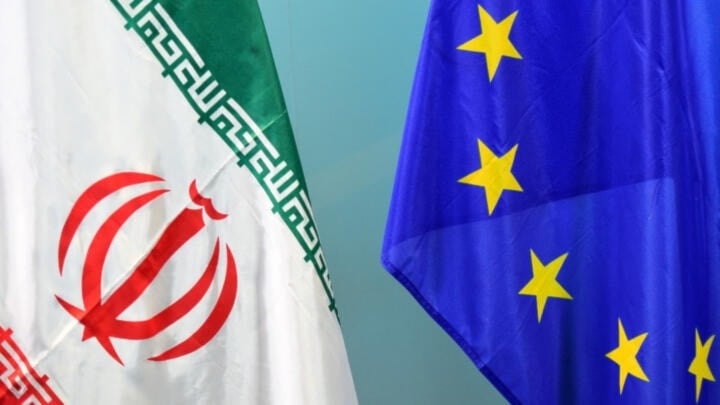Iran, E3 agree to resume nuclear negotiations
Iran and the European troika agree in principle to resume nuclear talks, with timing and location still under discussion.
-

Close-up of the Iranian flag (left) and European Union flag (right), undated. (AFP)
Iran and the European troika, comprising the United Kingdom, France, and Germany, have agreed in principle to resume nuclear negotiations, a source told Tasnim News Agency. The talks are aimed at reviving discussions over Iran’s nuclear program and the potential removal of sanctions.
According to an informed source, Tehran and the E3 have reached a preliminary understanding on restarting nuclear negotiations. However, discussions regarding the time and location of the upcoming talks remain ongoing.
The hosting country for the next round of talks has not yet been determined, the source noted.
Reports suggest that the negotiations will take place at the deputy foreign minister level, involving senior diplomats. The upcoming talks are also expected to address key concerns, including Iran’s nuclear commitments and the easing of sanctions.
Iran nuclear negotiations have remained in limbo in recent months, but this renewed engagement signals a possible step forward in diplomatic efforts between Tehran and Brussels.
Iran urges Europe to abandon failed pressure tactics
On Friday, Iranian Foreign Minister Abbas Araghchi firmly rejected Western narratives surrounding the collapse of nuclear negotiations, placing full responsibility on the United States for both the unraveling of the 2015 nuclear agreement and the recent failure to revive diplomacy.
In a statement shared on X, Araghchi said that he held a joint teleconference with the foreign ministers of the E3, alongside the European Union’s High Representative. He emphasized that Iran has remained committed to dialogue, while it is Washington that has consistently undermined diplomatic progress.
"It was the US that withdrew from a two-year negotiated deal, coordinated by the EU in 2015, not Iran," Araghchi stated, adding, "And it was the US that left the negotiation table in June this year and chose a military option instead."
On a related note, Raouf Sheibani, the Iranian Foreign Minister’s special envoy for West Asia, earlier this week firmly rejected Western pressure to accept a revised nuclear deal.
In an interview for Al Mayadeen, he stated, "Iran will not back down in the face of any Western pressure or threats to activate the snapback mechanism."
Despite acknowledging that diplomacy remains the preferred path, Sheibani stressed that Tehran is "prepared for all scenarios" should negotiations collapse.
Citing the recent 12-day war, Sheibani criticized the West's reliance on coercion, saying, "Western military pressure during the 12-day war yielded no results, and any other form of pressure will not force Iran to retreat."

 3 Min Read
3 Min Read








